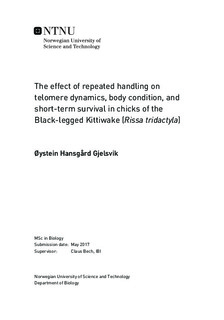The effect of repeated handling on telomere dynamics, body condition, and short-term survival in chicks of the Black-legged Kittiwake (Rissa tridactyla)
Master thesis
Permanent lenke
http://hdl.handle.net/11250/2447537Utgivelsesdato
2017Metadata
Vis full innførselSamlinger
- Institutt for biologi [2575]
Sammendrag
In the present study, effects of investigator disturbance on chicks of the Black-legged Kittiwake were investigated by looking at telomere dynamics, growth, and short-term survival. An experiment group was exposed to a handling procedure every second day for 25 days, and compared to a control group. Although both experimental and control chicks showed a statistically significant reduction in total telomere length, no difference was detected between the two groups despite visual signs of stress in the experimental chicks. A hyporesponsive stress period is suggested as a possible explanation for the lack of differences between the two groups in the present study. Although all research on populations of wild animals should continue to be conscious of the impact of human presence on the studied animals both for welfare and scientific reasons, the results strongly suggest that chicks of the Black-legged Kittiwake are resistant to investigator disturbance during the nestling period.
In the present study, chicks from larger broods had longer telomeres at age 31 days than chicks without siblings. Differences in parental quality are suggested as a possible explanation for the observed relationship. Furthermore, a positive correlation was found between telomere length at first sampling body mass 25 days later, which is consisted with previous findings on the relationship between telomere length and fitness.
